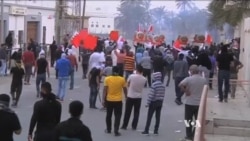There are warnings that the Gulf monarchies are dangerously out of touch with younger generations - and the falling price of oil is destroying the traditional economic bargain between the state and its people.
Gulf states largely avoided the turmoil seen elsewhere when the Arab Spring swept across the Middle East and North Africa in 2011. And currently, there is genuine adoration for the Gulf monarchies among its younger citizens, says Abdullah Baabood, director of Gulf studies at Qatar University.
“They really respect them, they love them,” he said. “But, when it comes to a point where these royal families do not evolve as much or reform as much, then you’re going to have that difficult problem.”
Such problems erupted into street protests in Bahrain, where sectarian tensions exacerbate protests over basic human rights. Security services have crushed most of those demonstrations.
Across the Gulf, younger generations are putting a strain on traditional politics, says Jane Kinninmont from policy group Chatham House.
“While they have very different views on issues like democracy and the role of religion, they tend to expect and to demand a greater say in how their politics and their society develops,” she said,
Sixty percent of the Gulf population is under the age of 30. A big disparity exists between the elderly Gulf monarchies and the so-called ‘Twitter generation,’ said Abbas Allawati, a journalist based in Dubai.
“The Internet has given us this method of freedom of expression that has been unprecedented,” he said. “A lot of Gulf states haven’t been able to come to terms with that.”
Chatham House calculates that three of the six Gulf Cooperation Council or GCC states need an oil price of $100 per barrel to balance their budgets. Recent prices have fallen to half that.
In Saudi Arabia, population growth means there’s less revenue to go round.
“One of the first acts of the new king coming to power was to announce new public spending worth an estimated $32 billion,” said Kinninmont. “That’s around 5 percent of GDP. It’s a symptom of the short-termism of economic policy as rulers try to use economic policy to solve political problems.”
Citizens are demanding more freedoms - from women demanding the right to drive, to bloggers like Raef Badawi in Saudi Arabia demanding more political freedoms. If the monarchies are to survive they must evolve, said Baabood.
“The Gulf people do not look for revolution,” he said. “Especially when the revolutions have failed in the other Arab countries. What they are looking for is gradual evolution of efficient government and bureaucracies that can deliver.”





